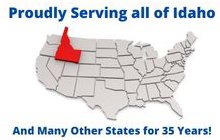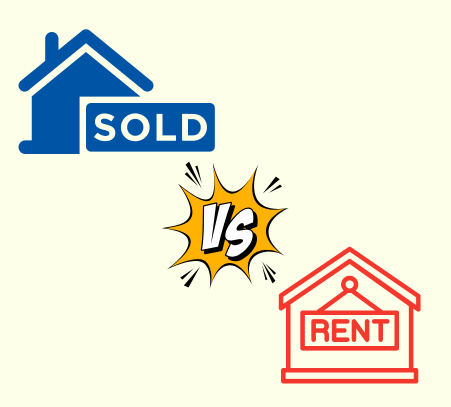Buying or renting a home is one of the most significant financial decisions you will make. It’s not just about money—it affects your lifestyle, flexibility, and long-term financial goals. While research suggests that buying is cheaper than renting in many cities, weighing all factors before making a decision is essential. Let’s break down the pros and cons of homeownership and renting to help you make the best choice.
The Pros of Homeownership
1. Predictability and Stability
Owning a home with a fixed-rate mortgage ensures that your monthly payments remain consistent throughout your loan’s term. This predictability helps you budget effectively for other financial goals, like retirement or your child’s education.
2. Building Equity and Wealth
When you pay a mortgage, you’re investing in your future. Each payment increases your equity, meaning you own more of your home. Over time, property values tend to rise, providing you with long-term financial gains.
3. Personalization and Customization
Homeowners have the freedom to modify their space however they see fit. Whether upgrading your kitchen, adding a garden, or painting your walls, your home truly becomes your own.
4. Tax Benefits
Owning a home can provide tax deductions on mortgage interest and property taxes, saving you thousands of dollars annually.
5. Sense of Community
Buying a home often means staying in one place longer, helping you build relationships with neighbors and become part of a community.
The Cons of Homeownership
1. High Upfront Costs
Home purchasing requires a down payment, closing costs, property taxes, and homeowners’ insurance. These expenses can make buying a home more challenging for some individuals.
2. Long-Term Commitment
Unlike renting, where you can move at the end of your lease, selling a home takes time and effort. If you need to relocate for work or personal reasons, breaking a lease might not be as easy.
3. Maintenance and Repairs
Homeowners are responsible for all maintenance and repairs, which can be costly and time-consuming. From fixing leaks to replacing roofs, these expenses add up over time.
4. Market Fluctuations
While home values generally rise over time, there’s no guarantee. If the housing market crashes, you could have a home worth less than you paid.
The Pros of Renting
1. Flexibility and Mobility
Renting allows for greater mobility. If your job requires frequent relocation or you’re unsure about settling in one area long-term, renting provides flexibility.
2. Lower Upfront Costs
Renting usually requires only a security deposit and the first month’s rent, making it a more affordable option upfront compared to buying.
3. No Maintenance Responsibilities
One of the biggest perks of renting is that the landlord handles maintenance and repairs. If something breaks, you don’t have to worry about the cost or hassle of fixing it.
4. No Property Taxes
As a renter, you don’t have to worry about fluctuating property taxes, which can be a significant expense for homeowners.
The Cons of Renting
1. No Equity or Investment Returns
Renting doesn’t build wealth. Every monthly payment benefits your landlord instead of increasing your personal net worth.
2. Unpredictable Rent Increases
Unlike a fixed mortgage, rental prices can increase yearly. If rent costs rise significantly, staying in your current home might become unaffordable.
3. Limited Personalization
Most landlords don’t allow significant modifications. You might be unable to paint walls, change fixtures, or personalize your space as much as you’d like.
4. Potential for Eviction or Lease Non-Renewal
A landlord can decide not to renew your lease, forcing you to find a new place unexpectedly.
Key Factors to Consider When Deciding
1. Your Financial Situation
Buying might be a better option if you have sufficient savings for a down payment and want to build equity. Renting could be the way to go if you need flexibility or don’t want maintenance responsibilities.
2. Your Long-Term Goals
Do you see yourself settling down in one place for many years, or do you value the ability to move easily? Answering these questions can guide your decision.
3. Market Conditions
Housing market trends vary by location. In some cities, buying may be more cost-effective, while renting might be the more innovative financial move in others.
FAQs
1. Is buying always cheaper than renting?
Not necessarily. While mortgage payments may be lower than rent in some areas, upfront costs, maintenance, and property taxes can add up.
2. How much should I save before buying a home?
Ideally, you should have a down payment of at least 10-20% of the home’s price, plus additional savings for closing costs and emergencies.
3. What are the most significant risks of renting?
Rent increases, lease termination, and lack of control over your living space are common risks renters face.
4. Can I buy a home with bad credit?
Yes, but it may be more challenging. You might need a larger down payment or higher interest rates. Some loan programs cater to buyers with lower credit scores.
5. When is the best time to buy a home?
Market conditions fluctuate, but generally, the best time to buy is when interest rates are low and you’re financially prepared.
Conclusion
Choosing between renting and buying depends on your lifestyle, financial situation, and future goals. Homeownership might be the right fit if stability, investment potential, and creative freedom appeal to you. On the other hand, renting could be the best option if flexibility, lower upfront costs, and minimal responsibilities align better with your needs. Consider all factors carefully to make a decision that works for you.
If you’re unsure whether buying a home or renting is the best option, consider contacting InterWest Mortgage for guidance. We have the experience and knowledge to help you decide which path is best for you. As mentioned, there are many factors to consider, and we can help you make the best decision based on your current and future goals.





